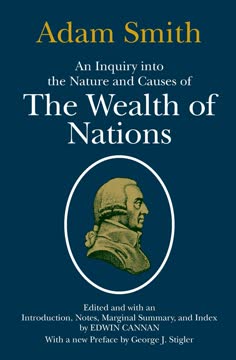Key Takeaways
1. Markets Thrive on Limited Intervention
Little else is requisite to carry a state to the highest degree of opulence from the lowest barbarism, but peace, easy taxes, and a tolerable administration of justice.
Invisible Hand guides. Adam Smith, witnessing the Industrial Revolution, articulated the concept of the "invisible hand," where market forces of supply and demand naturally determine prices and allocate resources efficiently without significant government interference. He envisioned a limited state focused on defense, justice, and certain public works, viewing excessive intervention and taxation with skepticism.
Spontaneous order emerges. Friedrich Hayek, a leading voice of the Austrian School, built on this, emphasizing that free markets create a spontaneous order. Prices act as crucial signals, coordinating the dispersed knowledge held by millions of individuals, a task impossible for any central planner. He argued that government attempts to direct the economy inevitably lead to inefficiency and a loss of freedom.
Avoid unnecessary distortions. Both economists believed that prosperity is best achieved when individuals are free to pursue their self-interest within a stable legal framework. They saw government intervention beyond essential functions as creating distortions that hinder the market's natural ability to optimize production and exchange, ultimately slowing economic progress.
2. Free Trade Benefits All, But Creates Losers
I shall greatly regret that considerations for any particular class, are allowed to check the progress of the wealth and population of the country.
Comparative advantage drives trade. David Ricardo formalized the theory of comparative advantage, demonstrating that all countries benefit from specializing in producing what they are relatively best at (or least bad at) and trading with others. This specialization increases overall global efficiency and allows nations to consume more than they could by producing everything domestically.
Distributional impacts exist. While trade benefits the nation as a whole, it creates winners and losers within a country. Paul Samuelson's work, building on Ricardo's, showed how trade affects wages and incomes, potentially leading to stagnant wages for workers in industries facing import competition, even as the overall economy grows.
Address losers domestically. The current backlash against globalization, seen in events like Brexit and Trumpism, partly stems from these uneven gains. Economists argue that the solution is not to abandon trade, which provides overall benefits, but to implement domestic policies that help those who lose out, such as retraining or targeted support, rather than resorting to protectionism.
3. Capitalism's Engine is Creative Destruction
Creative Destruction is the essential fact about capitalism.
Innovation drives change. Joseph Schumpeter described capitalism as a dynamic system constantly revolutionized from within by innovation. This "perennial gale of creative destruction" sees new products, methods, markets, and organizations displacing old ones, making existing industries obsolete but ultimately raising productivity and living standards.
Entrepreneurs are key. This process is driven by entrepreneurs who introduce these innovations, taking risks and seeking temporary monopoly profits before competitors imitate their ideas. Schumpeter saw entrepreneurship as a "feat not of intellect, but of will," essential for starting the engine of growth and disrupting the "treadmill of routine."
Requires a supportive system. While disruptive, this process requires a stable environment with the rule of law and protection of private property to flourish. Schumpeter believed that capitalism, despite its inherent instability and potential for social turmoil, was the most effective system for generating wealth and progress, progressively raising the standard of life for the masses.
4. Economic Growth Depends on Inputs and Technology
You can see the computer age everywhere but in the productivity statistics.
Inputs and technology matter. Robert Solow's growth model established that economic growth comes from increasing labor and capital, but sustained growth relies crucially on technological progress (Total Factor Productivity or TFP) that allows inputs to be used more efficiently. This technology is often embodied in new capital equipment and human skills.
Productivity slowdown is a challenge. Developed economies today face a worrying slowdown in productivity growth, a phenomenon
[ERROR: Incomplete response]
Last updated:
Review Summary
What Would the Great Economists Do? receives generally positive reviews for its accessible introduction to major economic thinkers and their ideas. Readers appreciate the biographical details and historical context provided for each economist. The book's approach of applying these theories to modern economic issues is praised, though some feel it falls short of fully exploring solutions. Critics note the narrow focus on growth-oriented economics and lack of environmental considerations. Overall, reviewers find it an informative overview for those interested in economic history and theory.
Similar Books








Download PDF
Download EPUB
.epub digital book format is ideal for reading ebooks on phones, tablets, and e-readers.




